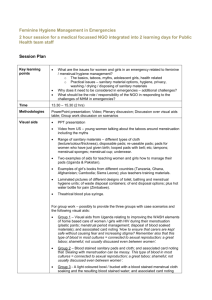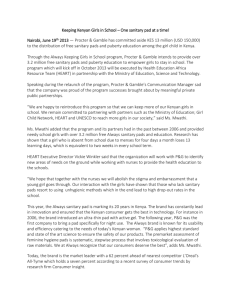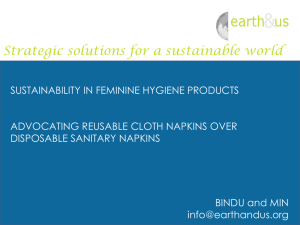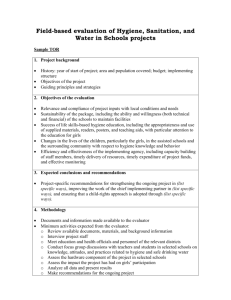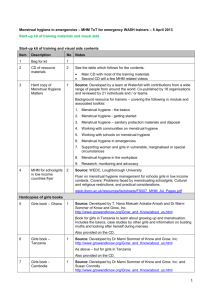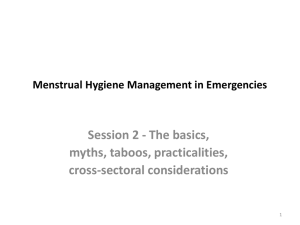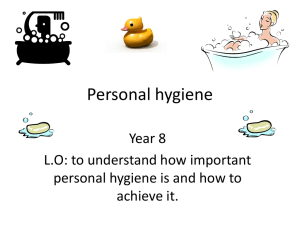(projdoc).
advertisement
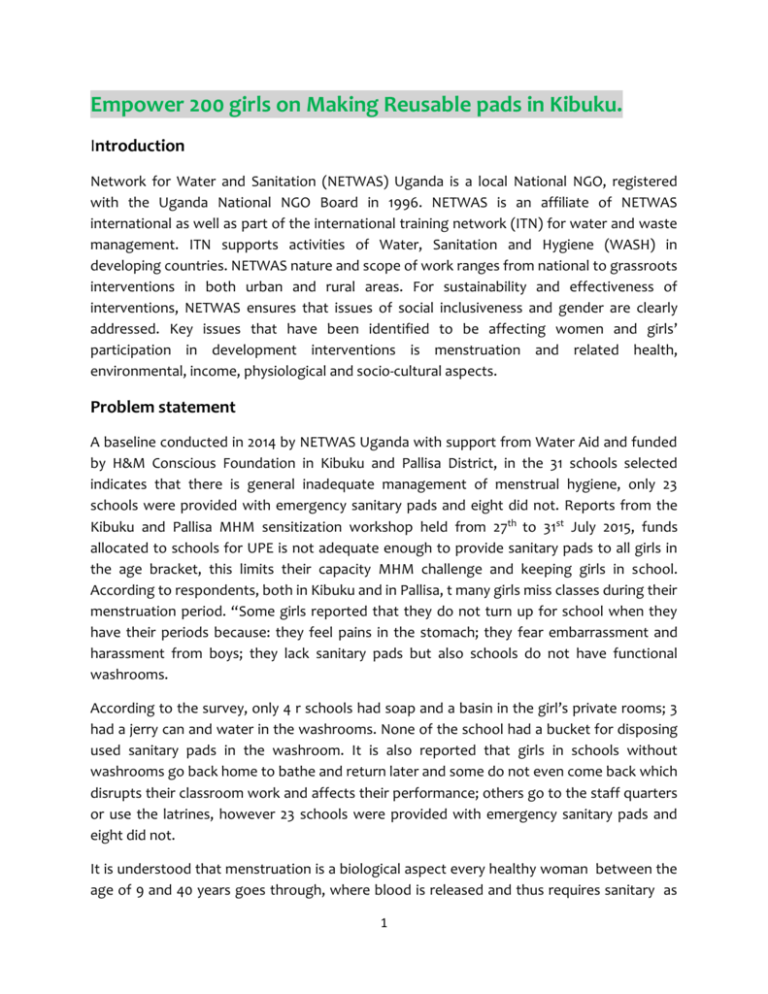
Empower 200 girls on Making Reusable pads in Kibuku. Introduction Network for Water and Sanitation (NETWAS) Uganda is a local National NGO, registered with the Uganda National NGO Board in 1996. NETWAS is an affiliate of NETWAS international as well as part of the international training network (ITN) for water and waste management. ITN supports activities of Water, Sanitation and Hygiene (WASH) in developing countries. NETWAS nature and scope of work ranges from national to grassroots interventions in both urban and rural areas. For sustainability and effectiveness of interventions, NETWAS ensures that issues of social inclusiveness and gender are clearly addressed. Key issues that have been identified to be affecting women and girls’ participation in development interventions is menstruation and related health, environmental, income, physiological and socio-cultural aspects. Problem statement A baseline conducted in 2014 by NETWAS Uganda with support from Water Aid and funded by H&M Conscious Foundation in Kibuku and Pallisa District, in the 31 schools selected indicates that there is general inadequate management of menstrual hygiene, only 23 schools were provided with emergency sanitary pads and eight did not. Reports from the Kibuku and Pallisa MHM sensitization workshop held from 27th to 31st July 2015, funds allocated to schools for UPE is not adequate enough to provide sanitary pads to all girls in the age bracket, this limits their capacity MHM challenge and keeping girls in school. According to respondents, both in Kibuku and in Pallisa, t many girls miss classes during their menstruation period. “Some girls reported that they do not turn up for school when they have their periods because: they feel pains in the stomach; they fear embarrassment and harassment from boys; they lack sanitary pads but also schools do not have functional washrooms. According to the survey, only 4 r schools had soap and a basin in the girl’s private rooms; 3 had a jerry can and water in the washrooms. None of the school had a bucket for disposing used sanitary pads in the washroom. It is also reported that girls in schools without washrooms go back home to bathe and return later and some do not even come back which disrupts their classroom work and affects their performance; others go to the staff quarters or use the latrines, however 23 schools were provided with emergency sanitary pads and eight did not. It is understood that menstruation is a biological aspect every healthy woman between the age of 9 and 40 years goes through, where blood is released and thus requires sanitary as 1 well as health intervention in terms of pads and knickers to prevent spillage as well as pain killers to manage the pain and counseling to manage the hormonal effects. Meanwhile resources for menstrual hygiene management are limited in availability due to affordability. It’s under such a background that NETWAS Uganda avails the following approach in implementing the Menstrual Hygiene Management activities in the two districts. A study conducted in Uganda by Prestwich (2013) indicates Knowledge on menstruation was poor amongst the school girls with 36.3% of girls believing that menstruation was a disease. Most girls used cloth (87.1%) during menstruation with less than half of girls (47.1%) using purchased sanitary pads. Around two thirds of girls (61.7%) reported normally missing some days of school in a month because of menstruation with the mean number of days missed at 1.64 (n = 133, SD = 1.835). The highest reported reason (63.8%) girls missed school during menstruation was the lack of a private place to wash and change at school. Girls in focus groups from the more rural schools prioritized reusable pads as the most important solution whereas girls in schools closer to a village prioritized disposable pads.1 This correlates to the 2012 SNV study which indicates 60% of the girls missing schools due to menstruation. A high number of school girls who have reached puberty do not wear appropriate sanitary towels during menstruation due to very limited access to standard sanitary pads which are expensive for most rural families and also not a priority to spend on .In addition the lack of adequate wash rooms and water to bathe conspires to increase the suffering of pubescent girls from health to physiological problems associated with the dignity experienced due to the lack of suitable places to change and dispose of their pads and soiling their uniforms. A Snap shot of NETWAS Uganda’s Experience in Menstrual Hygiene Management As an actor in the WASH sector with over 3 years in implementing menstrual hygiene management (MHM) interventions in schools; NETWAS Uganda has in the districts of Luwero, Kamuli, Tororo, Lira and Alebtong under the EC WASH project successfully made menstrual hygiene management one of 2 the core aspect of school health club action areas and also supported the training in the making of reusable pads in 84 primary schools (26 in Luwero, 22 in Kamuli, 17 in Lira/Alebtong and 19 in Tororo). To further strengthen the MHM component NETWAS Uganda has produced a guide for MHM which has been distributed to over 100 schools of Uganda, the schools are using the booklet to support menstrual awareness among primary school children. Additionally NETWAS Uganda is one of the actors that have engaged in MHM related advocacy both at national and regional fora. This is evident in the 2012 National Learning Forum on School WASH organized by NETWAS Uganda with a MHM component. Also the 2013 National Learning Forum on Sanitation as a Business where the component of marketing menstrual hygiene was projected and most recently in organizing the first ever International Menstrual Hygiene day in 2014. It is in line with this capacity and experience that NETWAS Uganda with partners is seeking support to implement a Menstrual Hygiene Management Project Target location Country Region Districts Uganda Eastern Kibuku District in 10 schools Time frame The Proposed activities will be implemented by NETWAS in duration of 1 year starting January 2016 to December 2017. GENERAL OBJECTIVE: Over all Objectives: To strengthen the capacity of pupils (girls) in school, senior women teachers and health assistants through establishment of mechanisms of sustaining menstrual hygiene in schools. Specific objectives: o To enhance the capacity of school management committees, teachers and pupils in making reusable sanitary pads. o To strengthen the capacity of districts and sub county stakeholders in effecting effective management of menstrual hygiene interventions. 3 o To develop strategies for sustainable menstrual hygiene management, knowledge sharing, learning, coordination and resource mobilization amongst stakeholders at district and Sub County levels to promote the use of reusable sanitary pads. o To improve hygienic access, collection, disposal and reuse through consorting the efforts of MHM platform stakeholders Expected outcome o Improved knowledge and skills in making handmade reusable sanitary pads. o Improved strategy for continued peer monitoring and resource mobilization at the district level school level for sustainable provision of reusable sanitary pads. o Action plans on implementation of sustainable menstrual hygiene management at the district and school level developed. Target group: Adolescent girls, women, boys and girls in and out of school , PTA, SMC’s, teachers , school health clubs , , District staff and Sub county extension staff, and community health groups . Our approach NETWAS Uganda will work with closely with Kibuku district local government especially the education department who whose role will be to provide technical support and supervision. , a local NGO community health groups , schools , to address the challenges of affordability , accessibility, personal hygiene , access to WASH facilities , disposal , knowledge and attitudes of menstruation faced by adolescent girls . Pads, capacity of project implementers will be built, assessment of schools that lack access to WASH facilities, and knowledge management and learning. The whole process will involve interactive dialogue meetings with key education stakeholders to ensure that their views and opinions are captured and there is agreed consensus on key issues to be addressed. i. As part of the effort to strengthen menstrual hygiene management NETWAS Uganda will build the capacity of stakeholders (senior women and men teachers, pupils, CDOs, health Assistants) in the making of reusable pads to enforce hygiene practices as well as build capacity in MHM counseling for girls. ii. Additionally focus on embedding MHM in the existing school health clubs. Other school activities will be undertaken with demand creating competitions around MHM and capacity development around awareness creation and advocacy. Target Participants in the districts. 4 o 200 members of School Health Clubs from the 10 school. o 10 Senior Women teachers. o 2Sub county Health Assistants. Detailed Activities o Weekly class meetings for girls MHM o Practical training in locally made sanitary pads targeting teachers & girls o Review meeting with SHCs. o Support supervision by the districts ( health & education) o Follow up on Teachers/SMCs Action plan Implementation o Review of School Health Club Action Plans. 3.0 Action Plan for Menstrual Hygiene Activities on the Work plan. Objective 1: 0. To strengthen the capacity of stakeholders to institutionalize MHM in their programming processes. Sn Activity Expected output Indicators 1. Conduct MHM sensitization dialogue meetings with school authorities and health workers MHM incorporated in school activities and budget No of schools Plenary with MHM PowerPoint incorporated in their activities and budgets % budget allocation to MHM. 2. Conduct training workshops for school health clubs on making reusable pads.1 in each School going Term period Follow up on adoption rate of making reusable sanitary 10 representatives of school health clubs trained on making reusable pads Monitor progress of and use of reusable No. of people Hands trained on training making reusable pads 3. Methodology Time frame and Qtr1 on Qtr1 Number of Observation adaptors and interviews (Schools and to schools and 5 Responsible Person Grace and peter azuba. Trainer Grace Orishaba and Peter Azuba. Grace Orishaba and Peter Azuba. pads. 4. 5. sanitary pads pupils) identified and practicing making reusable pads Follow up on Documentation Number of documentation about on how children follow up the utilization of the are making their visits made training (reusable) pads Report Writing Total Budget The overall budget will cost 12435 USD. 6 parents Follow-up visits Qtr. 3 Grace and and 4 Orishaba and documentation Peter Azuba Progress All Reports(Financi Quarte al and rs Technical) Grace and Peter Azuba, Daniel Baingana
